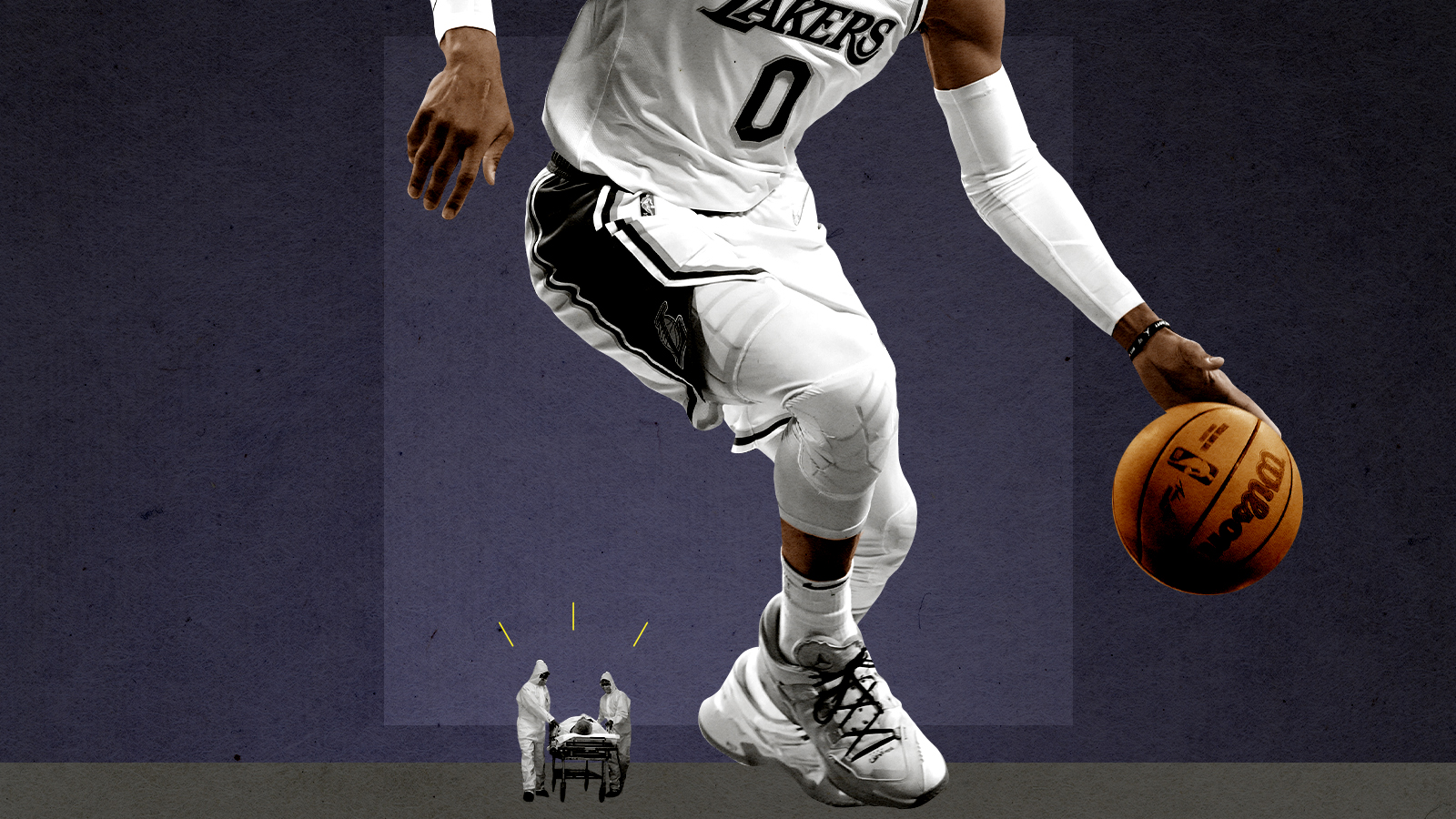The NBA plays while college games cancel. Is this our Omicron future?


A free daily email with the biggest news stories of the day – and the best features from TheWeek.com
You are now subscribed
Your newsletter sign-up was successful
Thanks to the Omicron variant of COVID-19, the holiday season is playing out a bit differently in the sports world this year. Sometimes games happen; sometimes they don't.
The NBA plugged away at its slate of Christmas games even though a number of teams were missing marquee players due to COVID exposure: Kevin Durant, Luka Doncic, and Trae Young were among the All-Stars absent from play. Meanwhile, several lesser college football bowl games — the Military, Fenway, and Hawaii bowls — shut down entirely because the virus had left teams with too few players to play.
Is this our pandemic future?
The Week
Escape your echo chamber. Get the facts behind the news, plus analysis from multiple perspectives.

Sign up for The Week's Free Newsletters
From our morning news briefing to a weekly Good News Newsletter, get the best of The Week delivered directly to your inbox.
From our morning news briefing to a weekly Good News Newsletter, get the best of The Week delivered directly to your inbox.
There's reason to think so. Like the NBA, giant corporations are gutting it out with something less than their usual level of service — U.S. airlines are still operating, for example, though there's a not-insignificant chance your flight might be canceled or postponed because its pilot is at home in quarantine, and your rental car situation might be similarly precarious. And like the bowl games, smaller mom-and-pops are often having to shut down operations, surrendering to self-imposed "soft lockdowns" made necessary by a growing roster of sick workers. (Similarly, a blockbuster like a new Spider-Man movie is doing great despite COVID, while smaller films are having trouble at the box office.) The inequality is obvious.
One way to avoid another season of disaster for small businesses: Revive earlier pandemic-era programs like the Paycheck Protection Act — which stopped giving out money last spring — to help them stay afloat amidst all the turbulence. Politico reports there is already a push in Congress to do just that, especially with the Build Back Better bill hanging in limbo.
There are obstacles to this idea. Just last week, the U.S. Secret Service reported criminals had stolen $100 billion in pandemic relief funds. Arguably that's a small amount compared to the $3.5 trillion in emergency aid disbursed since COVID lockdowns began in March 2020 — and an acceptable drawback for getting needed money to recipients in a hurry — but such headlines tend to make politicians skittish.
The bigger question is whether Omicron is a temporary problem or if this is what our pandemic future looks like. If it is, temporary aid to small business might not be that helpful — it might simply delay painful but inevitable adjustments to a new normal. At some point, an emergency stops being an emergency and instead becomes ... life.
A free daily email with the biggest news stories of the day – and the best features from TheWeek.com
Joel Mathis is a writer with 30 years of newspaper and online journalism experience. His work also regularly appears in National Geographic and The Kansas City Star. His awards include best online commentary at the Online News Association and (twice) at the City and Regional Magazine Association.
-
 Antonia Romeo and Whitehall’s women problem
Antonia Romeo and Whitehall’s women problemThe Explainer Before her appointment as cabinet secretary, commentators said hostile briefings and vetting concerns were evidence of ‘sexist, misogynistic culture’ in No. 10
-
 Local elections 2026: where are they and who is expected to win?
Local elections 2026: where are they and who is expected to win?The Explainer Labour is braced for heavy losses and U-turn on postponing some council elections hasn’t helped the party’s prospects
-
 6 of the world’s most accessible destinations
6 of the world’s most accessible destinationsThe Week Recommends Experience all of Berlin, Singapore and Sydney
-
 Big-time money squabbles: the conflict over California’s proposed billionaire tax
Big-time money squabbles: the conflict over California’s proposed billionaire taxTalking Points Californians worth more than $1.1 billion would pay a one-time 5% tax
-
 Did Alex Pretti’s killing open a GOP rift on guns?
Did Alex Pretti’s killing open a GOP rift on guns?Talking Points Second Amendment groups push back on the White House narrative
-
 Washington grapples with ICE’s growing footprint — and future
Washington grapples with ICE’s growing footprint — and futureTALKING POINTS The deadly provocations of federal officers in Minnesota have put ICE back in the national spotlight
-
 Trump’s Greenland ambitions push NATO to the edge
Trump’s Greenland ambitions push NATO to the edgeTalking Points The military alliance is facing its worst-ever crisis
-
 Why is Trump threatening defense firms?
Why is Trump threatening defense firms?Talking Points CEO pay and stock buybacks will be restricted
-
 The billionaires’ wealth tax: a catastrophe for California?
The billionaires’ wealth tax: a catastrophe for California?Talking Point Peter Thiel and Larry Page preparing to change state residency
-
 Trump considers giving Ukraine a security guarantee
Trump considers giving Ukraine a security guaranteeTalking Points Zelenskyy says it is a requirement for peace. Will Putin go along?
-
 Bari Weiss’ ‘60 Minutes’ scandal is about more than one report
Bari Weiss’ ‘60 Minutes’ scandal is about more than one reportIN THE SPOTLIGHT By blocking an approved segment on a controversial prison holding US deportees in El Salvador, the editor-in-chief of CBS News has become the main story
